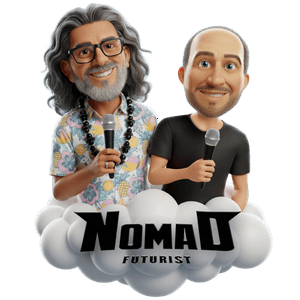On the latest Nomad Futurist Podcast, co-hosts Nabeel Mahmood and Phillip Koblence sit down with Adam Gibson, Director of techvox and a Nomad Futurist Foundation Ambassador, to discuss his unconventional journey into data centers and fiber. The conversation spans his work across Australia, New Zealand, and APAC, highlighting how curiosity, community, and fundamentals can drive a long, global career in digital infrastructure.
Adam’s journey begins in his early teens, as a 13-year-old immersed in video games, building LANs with friends and running grassroots events that unknowingly set the foundation for his first data center role:
“I came straight from high school into the space and haven’t looked back… I’m still technically uneducated. However, data centers make you run fast and learn quick.”
Throughout the episode, Adam underscores a core truth of the industry: today’s AI platforms, hyperscale campuses, and cloud services are built on the same foundational principles he first encountered in early server farms and the dial-up gaming era. He argues that the Internet has become a true utility, selected alongside power, water, and gas when moving into a home, yet its physical foundations are often taken for granted:
“We still need the fundamentals… people’s crazy cat videos, AI videos, e-mails and everything else need to be stored somewhere, cooled somewhere, powered somewhere and connected somewhere.”
That perspective carries into Adam’s work as a Nomad Futurist Foundation Ambassador, where he is focused on attracting new talent as data center and subsea investment accelerates across APAC. He highlights Australia’s role in global subsea connectivity and New Zealand’s renewable energy strength as forces turning the region into a critical digital crossroads in need of skilled people.
His message to newcomers is clear and encouraging. Opportunities span mechanical systems, networking, AI, and operations, and success comes from respecting the fundamentals and staying curious:
“Don’t just jump in as a VP going ‘I’ve got this’… work yourself into it; there’s a spot for you.”
The episode also shows the human side of a global career: Adam relies on music, movement, and simple meals to stay grounded while traveling for industry events and work, logging more than 100 flights and navigating relentless time zones. He highlights major event hosts, all partners and supporters of the Foundation, showcasing the community-driven side of the industry. While he plans to slow down, his commitment to the field remains unwavering:
“I’ll never miss a PTC, I’ll never miss an ITW, I’ll never miss a Capacity or a DataCloud… but at some point it’s about lifestyle and support.”
Connect with Adam Gibson on LinkedIn to continue the conversation and learn more about his work across APAC, digital infrastructure, and talent development.


